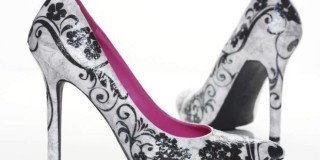Loading
Search
▼ In Japan, A Campaign Against High Heels Targets Conformity, Discrimination
- Category:Event
From that tweet, a movement was born, christened #KuToo in a nod to the #MeToo movement, the phrase a play on the Japanese word kutsu, meaning shoes, and kutsuu, meaning pain.
A year ago, Yumi Ishikawa came home from her job at a Tokyo funeral services company, her feet hurting and bleeding, and tweeted out a message to the world.
“I want to stop this culture of requiring women to wear high heels and pumps at work,” the former model wrote. “Why do we have to work with our feet injured while men are wearing flat shoes?”
From that tweet, a movement was born, christened #KuToo in a nod to the #MeToo movement, the phrase a play on the Japanese word kutsu, meaning shoes, and kutsuu, meaning pain.
It prompted a backlash on social media from both men and women, as well as insults and abuse for Ishikawa, but also a petition signed by nearly 32,000 people that has challenged Japan’s culture of conformity to societal expectations and deeply embedded gender discrimination.
Selected as one of the 10 most memorable buzzwords in Japan in 2019, #KuToo may not have changed the way many Japanese women are required to dress at work, but it has afforded them a new voice.
“I’m having a great time,” said Ishikawa, 33, who describes herself as an actress, writer and feminist, in a recent interview just before the launch of a website designed to bring new structure to the movement. “I don’t see myself as a leader. But just like acting, this is a way to express myself.”
Although the #MeToo movement has gained less momentum in Japan than in the West, thousands of women have taken part in monthly “Flower Demonstrations” against sexual violence in cities across the country since last April.
The movement scored a notable victory in December when journalist Shiori Ito won about $30,000 in damages from a powerful television journalist in a landmark rape case.
“That has been an extremely big encouragement for me,” Ishikawa said. “It sent a powerful message.”
But Ishiwaka’s own message — that women should have the same footwear choices as men — hasn’t always been well received in Japan’s conservative, don’t-rock-the-boat society. It’s not a question, she patiently reiterates, of telling women they can’t wear high heels, or even suggesting they should be allowed to wear sneakers, but an attempt to “level the playing field” so women are not forced by corporate dress codes to conform to a different standard from men.
Online, many critics focused on her background as an adult bikini model — the implicit assumption, she says, being that people who work in the sex or modeling industries have no standing to complain about discrimination.
In a book published in November, Ishikawa spends dozens of pages listing the insults and criticisms she received on Twitter, as well as her rebuttals.
“People ask, ‘Why are you undressing yourself when you are campaigning against sex discrimination?’ or say, ‘You should be more polite,’ ” she said. “It’s tough to endure such criticism, but I’m not someone who can stay quiet.”
Many people, she says, reject her linkage of footwear to sex discrimination, arguing that it’s a health or labor issue. That just illustrates, she says, how unaware many Japanese people are about the discrimination that is prevalent in a country ranked 121st out of 153 nations in the World Economic Forum’s 2020 Global Gender Gap rankings.
Some 30 percent of her critics are women, she says, many of whom see her as selfish.
“They think they have been obedient to the rules forced upon them, ‘so why can’t you?’ ” she said.
Whether it is how you dress or what you think, she says, it’s seen as correct to be the same as everyone else. “And when you deviate from others, you are seen as being off-key.”
A few Japanese female executives who work for foreign companies have offered words of support, but most of the women who have risen within Japan’s male-dominated corporate world have stayed silent. Ishikawa speculates their rise depended on suppressing their real selves.
Indeed, corporate Japan has not exactly embraced #KuToo, although there are exceptions. The cosmetics company Orbis has supported the movement and encourages staff to dress as they like at work, according to Ishikawa. The cellphone operator Docomo changed its dress code last year so women weren’t forced to wear high heels, but it said the shift was not prompted by the movement.
“Businesses probably see the issue of discrimination as women talking about something annoying,” Ishikawa said. “They tend to shy away from it, seeing us as radical, but on our part we think we are not saying anything controversial.”
The government has not included the issue of high heels in new guidelines on workplace harassment drafted at the end of last year, but it will be included, she says, in a forthcoming handout from the Ministry of Health, Labor and Welfare.
In Japan, people such as Ishikawa are often branded “activists,” as a way of marginalizing their messages. It is a label she rejects.
Still, her ultimate goal is not just to secure for women in Japan the freedom to wear the same shoes as men. It is to end discrimination against them more broadly.
Last month, she launched a new team she calls the ”#KuToo Wave of Action.”
“We need to have fun and share tasks to make this campaign bigger and make it last longer,” Ishikawa said in a video.
Plans include a YouTube channel, as well as actions to mark International Women’s Day.
“We’re taking action to make a society where everyone can have the same choices as a matter of course,” she said. “Regardless of gender.”
- February 22, 2020
- Comment (0)
- Trackback(0)


